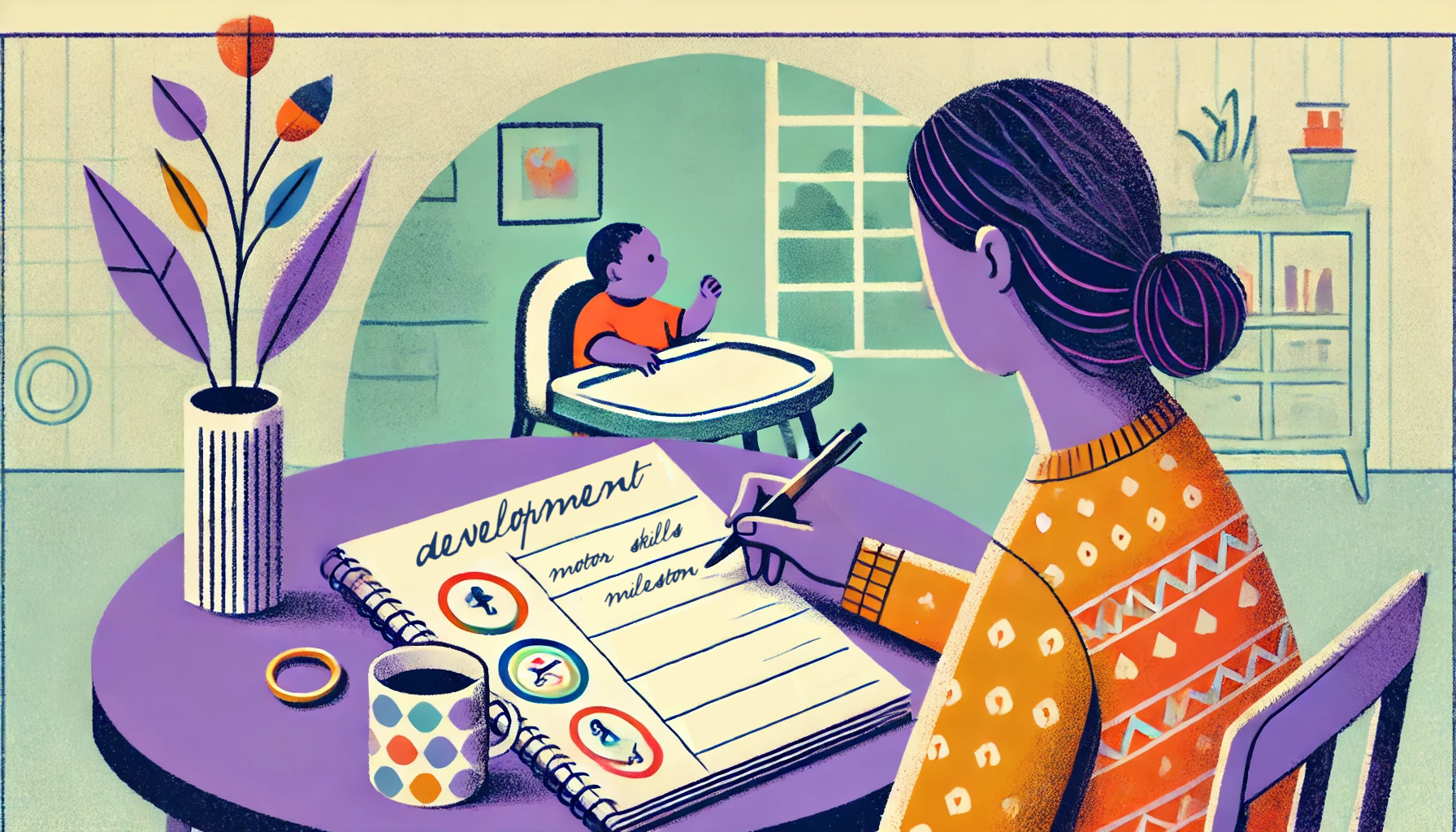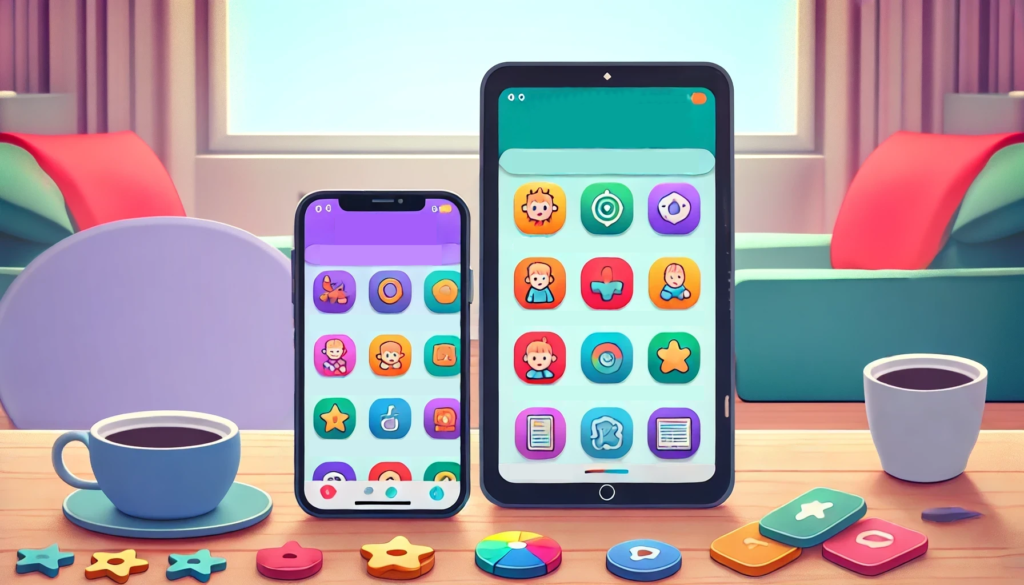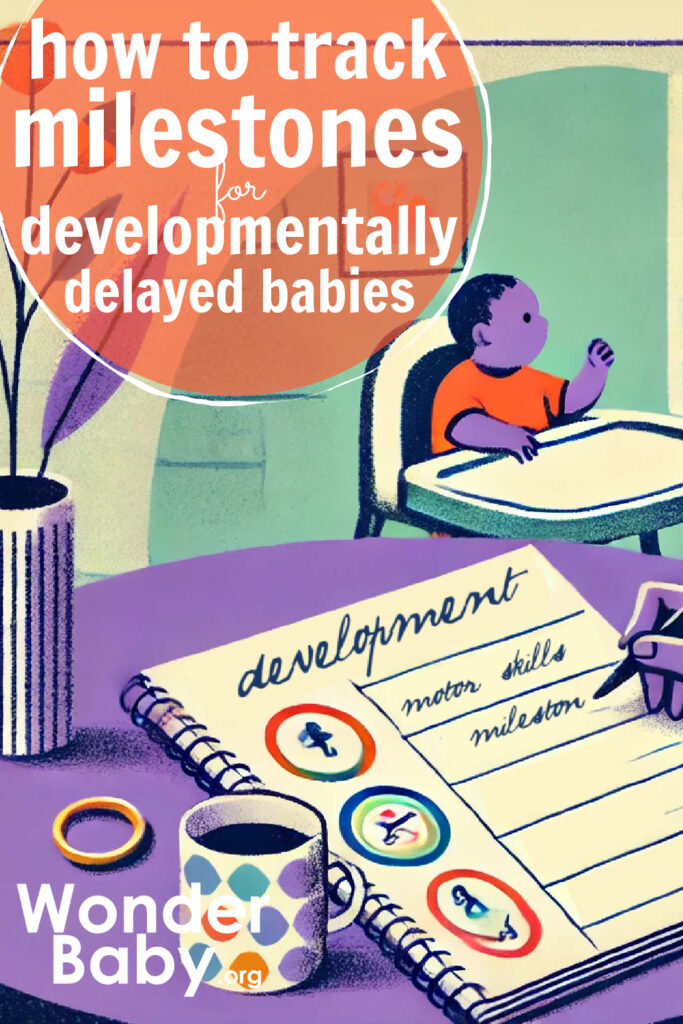How to Track Milestones for Developmentally Delayed Babies

This post may contain affiliate links; please see our terms of use for details.
Developmental milestones are a set of skills or behaviors that most children achieve within a certain age range. They provide parents and caregivers with a roadmap of what to expect as a child grows and are typically grouped into five main categories: motor, social, cognitive, communication, and adaptive skills.
While these categories offer a helpful framework for tracking progress, it’s important to remember that every child is unique, and children with developmental delays may follow a different timeline or pathway.
- Motor skills involve physical movements and coordination. These milestones range from early achievements like lifting the head and rolling over to more advanced abilities such as crawling, walking, jumping, and running. For children with physical disabilities or low muscle tone, these milestones might be delayed, and adaptive approaches may be needed to support their progress.
- Social skills refer to how children interact with others and respond to social cues. This includes milestones like smiling, making eye contact, forming attachments, and learning to share. Children with developmental delays might require additional support to develop social skills, especially if they struggle with sensory processing or have difficulty understanding social signals.
- Cognitive skills encompass problem-solving, learning, and understanding how the world works. These cognitive milestones might involve exploring objects, recognizing familiar people, or completing simple puzzles. Children with intellectual or sensory disabilities may reach these milestones more slowly or in different ways, often showing strengths in specific areas while needing help in others.
- Communication skills focus on expressing needs and understanding language. Early communication milestones include cooing, babbling, pointing, and responding to names. Some children with developmental delays might rely on alternative forms of communication, such as sign language, picture boards, or assistive technology, to support their language development.
- Adaptive skills are practical, everyday abilities that help children become more independent, such as feeding themselves, dressing, and following routines. These adaptive milestones may take longer for children with delays to master, often requiring step-by-step guidance, therapy, or specialized tools.
Tools and Methods for Tracking Milestones

Tracking your child’s developmental milestones can feel overwhelming, but with the right tools and methods, it becomes a manageable and even rewarding process. Here are four practical ways to monitor progress and gain valuable insights into your child’s development.
- Keep a Developmental Journal: Record key milestones in a developmental journal and note the date when your child accomplishes a new skill, no matter how small it may seem. Document if they were using a specific therapy tool or adaptive equipment or if they were in a particular setting that seemed to help. Over time, your journal can help reveal trends in your child’s progress, making it easier to celebrate successes and identify areas that need additional support.
- Use Milestone Charts Tailored for Developmentally Delayed Children: While generic milestone charts, like this one from the CDC, can be helpful in understanding when certain skills should be mastered, they might not fully capture the unique trajectory of children with developmental delays. Instead, look for resources specifically designed for your child’s needs. For example, check our developmental checklists for kids who are visually impaired or search for other condition-specific charts. Ask your child’s healthcare providers or therapists if they have developmental charts specific to your child’s condition, such as charts designed for children with Down syndrome, autism, or other diagnoses.
- Download Apps for Milestone Tracking: Technology can simplify milestone tracking, making it accessible and organized. Some apps to check out are Milestone Tracker from the CDC; BabySparks, which offers personalized activities and tracking tools to support a wide range of developmental needs; Wonder Weeks, which is ideal for parents of premature or delayed babies, as it accounts for adjusted milestones; or Cubtale Baby Tracker, a comprehensive app that allows you to log progress and receive reminders for upcoming developmental goals.
- Collaborate With Professionals: Your child’s pediatrician, therapists, and early intervention team are invaluable allies in tracking milestones and providing support. Schedule periodic reviews with your child’s care team to discuss their progress and adjust goals as needed.
By combining these tools and methods, you’ll gain a clearer picture of your child’s development, empowering you to support their growth and celebrate their achievements along the way.
Milestone Tracking Can Be a Positive Experience!
Tracking your child’s developmental milestones doesn’t have to be a source of stress. With the right mindset and support, it can be a rewarding way to celebrate your child’s growth and unique journey. Here are four tips to keep milestone tracking a positive and encouraging experience.
- Focus on Progress, Not Perfection: Instead of fixating on when milestones are achieved, focus on how far your child has come. Progress, no matter how incremental, is meaningful. Remember that success might look different for your child. Perhaps they learned to reach for a toy in a new way or showed interest in a social interaction. These moments deserve recognition!
- Celebrate Small Victories: Each new skill, no matter how small, is a testament to your child’s hard work and resilience. Clap, cheer, and share their achievements with loved ones. Celebrating small milestones creates a positive atmosphere that encourages further growth.
- Recognize That Progress Is Non-Linear: Development is rarely a straight line. There may be plateaus or periods of regression, which are normal parts of the journey. A temporary slowdown doesn’t necessarily mean your child isn’t growing; it might mean they are consolidating skills or preparing for the next big leap.
- Seek Support During Challenges: If you notice stagnation or regression, reach out to your child’s care team. Therapists, pediatricians, and specialists can help you identify potential causes and offer strategies to support your child. Connecting with other parents of children with disabilities can provide emotional support and practical tips, as well.
By focusing on progress, celebrating victories, embracing the non-linear nature of development, and seeking help when needed, milestone tracking becomes less about meeting expectations and more about appreciating your child’s unique path. These small but meaningful shifts can transform milestone tracking into a positive and uplifting experience for both you and your child.
Further Reading
- Gross Motor Milestones for Typically-Developing Children: This article outlines key gross motor milestones from infancy through early childhood, providing a baseline for parents to understand typical physical development, which can be useful for comparison when tracking developmentally delayed babies.
- Understanding Gross Motor Delay in Children: Explore the signs, causes, and implications of gross motor delays, along with strategies for supporting children who might not meet traditional developmental checkpoints, helping parents to better understand and assist their child’s physical growth.
- The Four Major Types of Developmental Delays Explained: Learn about cognitive, motor, social-emotional, and speech/language delays, including how each can manifest and affect a child’s overall development. This article offers insights into recognizing these delays and seeking appropriate interventions.
- Development Charts for Blind and Visually Impaired Babies and Children: This piece provides specialized developmental charts tailored for children with visual impairments, highlighting unique milestones and adaptive techniques to track progress in areas like mobility, sensory development, and communication.
- Early Intervention for Kids with Developmental Delays: Discover the importance of early intervention programs, how to access them, and what they can offer in terms of therapy, education, and support to enhance developmental outcomes for children with delays.
- Understanding Cognitive Developmental Delay in Children: Delve into what cognitive delay means, how it differs from other delays, and explore methods for assessment and intervention to foster cognitive growth in children who are not meeting cognitive milestones.
- Speech Delay vs Autism: How to Recognize the Difference: This article helps differentiate between speech delays and symptoms of autism spectrum disorder, offering parents guidance on observing behaviors, understanding potential signs, and seeking the right professional help for accurate diagnosis and support.

Related Posts

Eye Conditions and Syndromes, Visual Impairment
Neuralink Announces Plans to Restore Sight to the Blind with Brain Chip
Elon Musk’s company Neuralink has announced plans to begin human trials of its new “Blindsight” brain chip by the end of 2025.

Special Needs
5 Spring Cleaning Tips for Families of Children with Disabilities
Spring cleaning is an opportunity to create a more accessible, organized, and supportive space for your child with disabilities. Declutter, deep clean, and refresh!

Visual Impairment
The Gift of Understanding: How a Young Child Helps His Blind Father Navigate Life
When a parent is blind, it’s natural for people to wonder how their sighted child will adapt. Will they struggle to understand their parent’s needs? Will they feel burdened by...